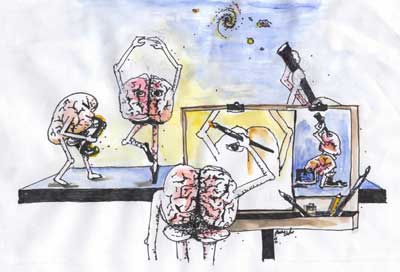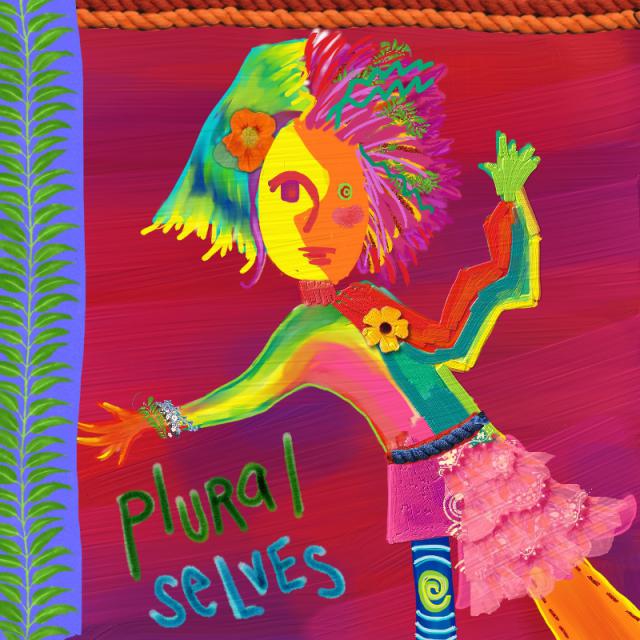Serendip is an independent site partnering with faculty at multiple colleges and universities around the world. Happy exploring!
BSIE 2010: Session 29

 |
Brain, Science, and Inquiry-Based Education
|
 |
Mini Co-constructive Conversations/Inquiries II
Picking up from Thursday
Who knew that babies are born with morality and mathematical abilities already pre-wired inside? .... really got our juices flowing about babies and their behavior. I think it was one of the most interesting discussions that we had in the institute ... Let's keep this one going through our blogs ... Jack
I think [Susan] hit the mark very well with the classification dilemma which had connections at least somewhere in the past to us al ... Joyce
Jack- I love your willingness to try different approaches to teaching. Your sense of humor helped to keep the lesson moving. You have an abundance of ideas and you are eager to share them with your students. Trust in yourself! Wonderful presentation ... Regina
This brought back great memories of my Dad, who was an artful and art filled Doodler. It also reminded me of Michael B., a middle school classmate and an excellent Doodler; especially during class when it drove the Nuns (our teachers) bonkers. This is a great lesson to begin the school year with, as it gets the students involved and on 'the same page' (pun intended). To finish this the end of the school year, putting the puzzle together all year long, would be a proud culminating class activity for each student in the class ... It provides an even playing field and an immediate sense of inclusion ... Geneva
Common threads ran through each lesson: 1) All participants were actively engaged ; 2) Each lesson was interesting/thought provoking; 3)participants were encouraged to share stories and observations; 4) There were no preset 'right answers' ; 5) No one arrived at a "one right answer"; and 6) at the end of each presentation, there remained the potential to extend each lesson, increase observations through the process of looping. None of the stories were finite. BRAVO!!! to each conductor ... Mattie
What is the goal of education? I've been fed many answers to this through middle-school, high school and college. Some answers revolved around "bench marks" set by administration, some around "learning all you can know" and some around "exploring possibilities." My favorite, of course, is exploring possibilities. I always felt that learning all you can know" and the concept of teaching to a test put inhibitions on me. I felt as if I was meant to 'only' learn certain things, as if there was a concrete barrier that I must eventually stop at once I approach it. "Exploring possibilities," while vague, is the concept that sends me striving for greater aspirations, pushing myself and those around me. While it is vague (and can be difficult to accept, given the fact that most institutions give a firm goal and 'brick wall'), it is worth really driving that message home to students at a younger age ... I think this "exploration" is overlooked in most educational settings, and I think that this is a sore disappointment for the population who deserves to have nothing except vast space to explore. No more brick walls. ... Brie
I love your idea of exploring possibilities. I think that culture (especially rigid cultural curriculum) can really create a situation of....well....less creativity. It is important to remove as much inhibition as possible in order to help students achieve their highest levels of potential in the proper context. However, I do feel that we do need to also teach to a degree the appropriate times to inhibit one's self in order to achieve. But the idea of exploring possibilities, I feel, can be done under both sets of circumstances ... Keith
Dual coding - Keith
The fifth loop? - Regina



Comments
A fifth loop? randomness? and co-constructive inquiry
Regina provided a wonderful summary of the looping theme of the institute, and used it, as it should be used, to raise a new question: could there be something else with which we're interacting? some "additional entity/force," something beyond the external material world, interpersonal interactions, and culture? Maybe something who existence is expressed through randomness? Her session very much exemplified the spirit of co-constructive inquiry/conversation, not only in what Regina laid out but in the group's response to it. Yes, there are differences among us in the degree to which we "believe' in an "additional entity/force," and those were well talked about. But there also emerged an interesting commonality: a preference to have a story that provides each of us room/opportunity to be ourselves a creative force in our own lives, and in the lives of others around us.
Could randomness be, as Regina suggested it might, be evidence for an "additional entity/force," a concept that masks our ignorance of things that influence us? Yes, of course. But there is a significant difference between randomness as I used the term and an "additional entity/force" as many people us that idea. Randomness, in my conception, is ... without pattern, without intent, without meaning, whereas most people expect an "additional entity/force" to act in ways that are orderly and have intent/meaning even if we don't understand it. In these terms, my question about a fifth loop is not whether it exists but whether it reflects intention/represents meaning. Yes, we are being acted on by things we don't fully understand. The question for me is whether those things do or don't have intention/meaning. And, it seems to me, the more they do, the less room there is for each of us to be ourselves a creative force. It is, in my mind, the very meaninglessness of the "additional force/entity" that gives us space to be creative forces ourselves.
I was intrigued too by by Regina's pointing out that "we are in the center of all the loops. If our brain is constructing reality for us, then we are the center of our private universe. Everything else revolves around us." I suspect that may indeed be the case, no matter how many loops one adds (cf "The significance of the story teller ..." in my 6 May 2006 conversation with an art historian). While the notion that we are each at the center of our own universe may be a little dizzying or disturbing at first glance, it is what gives each of us the wherewithal to both contribute to and learn from our differences with others. In this sense, it is not permission to live lives disconnected from others but rather encouragement to connect with others, to engage in co-constructive dialogue/inquiry. Recognizing that we are each at the center of our own universe is, like not finding meaning in the non-human world outside ourselves, part of the incentive to make common cause with others in the creation of meaning.
Excellent Workshop
Thank you Keith for new ideas and methods to explore and resolve student understanding. I loved the music layering and framing the experience with our words. Very interesting was how you took us back and then layered again with the structure words. You did a great job of organizing the information and delivering it in a clear and concise manner. SUSAN is going to be so mad that she missed this workshop!
I will take many parts of this and spin them for my science classes but I will immediately show our reading specialist. Thanks so much for your workshop and insight. You added a great deal to this Institute.
Thanks Joyce. I think that
Thanks Joyce. I think that is the idea, to change it so it fits your needs and your students' needs and to share it with those in the field. What would you change? What do you think could be done differently/better/more effectively?
Worth sharring
Keith- Great job this was so informative. I am going to take it back and use it and most of all share it. I wish that I would have had a teacher like you that is determined to work out side of the box. Have a great summer.
Thanks Kim. I think the box
Thanks Kim. I think the box we are asked to work in is wayyyyyyyyyyyyy toooooooooooooooo small.
I Agree
I agree with you that there were some things lacking in my presentation (I am the consomate over-planner). But I think I can answer your question by pointing you to the opening of the presentation with the doodling. My lesson had a focus on reading, therefore verbalizing what was visualized and vice versa. However, I think this can be done in the case of other modes of expression. There is receptive expression and expresssive reception. These can be used for say, non verbal learners or even those who have verbal skills but limitted vocabulary. I'd love to model how this works for you if you would like.
Dual Coding
Keith – Excellent presentation. You made a persuasive and compelling case for the theory of dual-coding. I was able to become totally involved in the process and became more creative. While I know time was limited, I would have benefited from some discussion on including this process with children who is unable to express themselves due to cognitive limitations.
Thank you for sharing this information with me. I can’t wait to try this with my students.
Post new comment